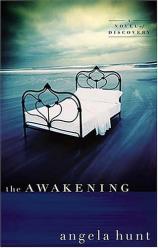The Awakening: A Novel of Discovery
Review
The Awakening: A Novel of Discovery
Aurora Norquest, the protagonist of Angela Hunt's THE AWAKENING: A Novel of Discovery, has hit bottom. She has spent much of her twenties and thirties as her mother's caregiver, but after the Alzheimer's-stricken Mary Elizabeth dies, Aurora (herself stricken with agoraphobia) rattles aimlessly around their Manhattan apartment. Despite the nosy-parker attentions of her mother's oldest friend and neighbor Clara Bowman, and in spite of the much gentler inquiries from her newest friend and neighbor, Philip Cannon, Aurora finds that things for her are falling apart and she has no center.
One of the reasons Aurora has no center to hold on to is because her mother's death leaves her a de facto orphan. Her father, Theodore Norquest, a wildly successful popular novelist, left the family before she was born and she has never received any communication from him. Slowly, as Aurora begins to explore what she might do now, she rekindles the interest she has always had simmering about contacting her father.
This is where Philip, a software engineer of about her own age, comes in handy --- he knows how to help Aurora (who can't even make it down to her building's lobby) connect to the world via the Internet (she's been receiving groceries, medicines and other supplies for years from New York City's endless variety of delivery services). While Philip remains gentle in his inquiries and in sharing his faith with Aurora, he obviously wants to help her break out of her cocoon rather than enabling her to remain stuck.
However, the darkest horizon is still to come (did you think it was a coincidence that "Aurora" means "dawn?" Not a chance --- but more on that in a moment). Mesmerized by a beautiful woman in a nearby penthouse who has everything, but lives an empty, perhaps morally repugnant, life, Aurora questions whether there is any purpose for her own life and makes a bad decision. When Philip comes to her rescue, bits and pieces of light peek through, and she learns that some of her beliefs about the past aren't accurate. By the story's end, Aurora is living in a new day and, while she has a lot of work ahead of her, has regained her hope and humanity.
By setting Aurora in her high-rise apartment, giving sparse details about appearances and situations, and including a somewhat mystical element, Hunt has given her novel an ethereal quality that is very appealing. Does this sound like a fairy tale? It's meant to be: Hunt set out to write something completely different from her previous books --- a parable. Of course, the original parables told by Jesus were simple stories, and although Hunt does keep things simple in THE AWAKENING, her modern artistic viewpoint (and perhaps modern readers' needs, too) means that things are a little more complicated in Aurora's world. That's why it feels more accurate to call this an allegorical novel, along the lines of John Bunyan's classic, THE PILGRIM'S PROGRESS, than to call it a parable.
But in the end that's quibbling over literary terms, since this novel does teach a lesson: we are all searching for Our Father, and so often we don't know how hard He has been trying to reach us.
Reviewed by Bethanne Kelly Patrick on July 7, 2004





